
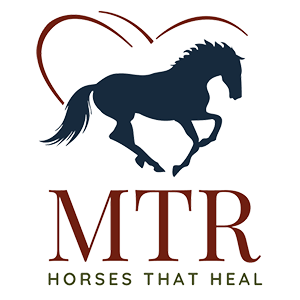
Maryland Therapeutic Riding, Inc.
1141 Sunrise Beach Road
CROWNSVILLE, MD 21032
Mailing Address:
1141 Sunrise Beach Rd.
CROWNSVILLE, MD 21032
Phone: 410-923-6800
MAKE AN INQUIRY
View our WEBSITE
EIN: 52-2035698Founded: 1996
View our PHOTO GALLERY
Profile Last Updated December 29, 2025Public Charity
Click here to view listing(s) of the program horses we are seeking
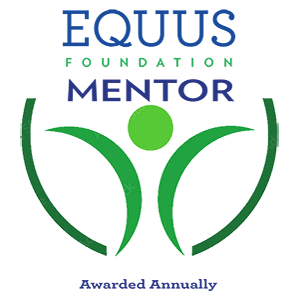
The Mentor Accreditation is awarded annually to an organization that operates at the highest standards for business and equine welfare practices in accordance with EQUUS Foundation guidelines for business and equine welfare practices outlined here.
Last Updated: May 31, 2025

MISSION & PROGRAMS
Mission:To transform lives by connecting humans and horses in a nurturing environment, fostering healing and growth for all.
Our organization conducts Equine Assisted Services in accordance with the EQUUS Foundation Guidelines on Qualifications of Organizations Conducting Equine Assisted Services (EAS).
Our organization provides outreach and/or public education programs involving horses.
100% of our total programs and services are equine-related.
Our organization is directly responsible for the care and shelter of equines involved in our programs.
Our organization does not CURRENTLY use satellite, overflow, foster, and/or outreach facilities.
Please describe what steps your organization takes to ensure that:
1) all interactions between your equines and people are mutually beneficial and conducted in accordance with the Guidelines for Human-Equine Interactions stated below;
2) all equines in the care of our organization and/or equines that participate in the organization's program have access to clean drinking water at all times; nutritious food in sufficient quantity, including natural forage such as pasture grass and/or hay; appropriate veterinary, farrier, and dental care; shelter and protection from the weather; sufficient safe space to move around comfortably on a daily basis; and daily opportunity to freely interact and have contact with other equines:
The Horse-Human Connection
Written By: MTR Leadership Staff
The bond between humans and horses has grown beyond agriculture and transportation to include recreation, companionship, healing, and therapy. This human and horse connection is central to equine-assisted services (EAS) and is evident daily at MTR.
Since our founding in 1996, our horses have been the heart of our mission. Volunteers witness the joy on the participants’ faces as they arrive, lighting up at the sight of Mr. Fluffy or Splash. Carter recognizes a child’s voice and walks to the fence for a nuzzle. Instructors guide lessons where horses instinctively adjust their pace, ensuring their riders’ comfort and success.
A unique aspect of this connection is its foundation in non-verbal communication. As prey animals, horses are highly attuned to human emotions, fostering a space where participants feel understood and empowered. Children used to structured schedules discover newfound independence, learning that subtle body shifts can communicate their intentions. Chrissy, a beloved MTR herd member for 16 years, has adapted to alternative cues, responding to a rider’s touch on her wither rather than a verbal command.
Studies show that equine-assisted activities reduce stress and enhance well-being. At MTR, this is clear when Mr. Fluffy follows his participant around the arena during difficult moments or even when volunteers find peace watching horses graze in the fields.
In equine-assisted psychotherapy, horses respond uniquely to each client, making emotions tangible in ways words cannot. Riders in speech therapy find fluency through the rhythm of a horse’s stride, while expressive language flourishes when recounting Chip’s playful antics. Angel, another MTR equine partner, has even sensed and responded to an impending seizure, ensuring her rider’s safety.
Horses provide a non-judgmental presence, particularly benefiting those with autism spectrum disorder (ASD) and social anxiety. The MTR community—participants, instructors, therapists, and volunteers—come together to celebrate successes and navigate challenges. Many riders look forward to seeing their volunteer teams just as much as their equine partner.
The human-horse connection is profound. Through their intuition and presence, horses provide therapy that transcends words. As research continues to highlight these benefits, equine-assisted services will remain vital in therapeutic and educational settings.
At MTR, we are committed to our horses’ well-being, ensuring they continue to serve with care and dedication. No matter what happens beyond our gates, our horses unite us. Carter reminds us of dedication, Angel teaches us to listen, and Chrissy shows us that growth comes from patience and care.
Horses are the heart of what we do and the force that moves us forward. We are truly humbled and grateful for all of the horses of MTR—past, present, and future.
Equine-Assisted Services
Over the years, Maryland Therapeutic Riding has grown in both scope and impact, becoming a trusted leader in equine-assisted services (EAS). Our diverse range of programs is tailored to meet the unique needs of each participant, focusing on improving physical strength, enhancing balance and coordination, and nurturing emotional well-being.
At MTR, collaboration is the cornerstone of our approach. Our programs are carefully designed to provide a seamless experience, ensuring that each participant's journey is not confined to a single service but evolves alongside their needs. Thanks to the dedication of our expert staff and dual-certified providers, many participants transition from therapy services to adaptive riding, building confidence, independence, and deep connections over time—some for more than 15 years.
Every service we offer is a team effort, where therapists, instructors, volunteers, and equine partners work together to foster an environment of trust, growth, and possibility. This integrated approach benefits not only the participants but also strengthens the MTR community, reinforcing long-term relationships that ensure continuity in care and support.
Beyond programming, this spirit of collaboration is the foundation of the inclusive and supportive community we cultivate each day. The bonds formed through our programs extend beyond the arena, creating lasting relationships that uplift and empower individuals and families.
Through our three core programs Adaptive Riding and Horsemanship, Occupational/Physical/Speech Therapies, and Equine-Assisted Psychotherapy—MTR is honored to be a beacon of hope, healing, and empowerment for many. The profound connection between humans and horses continues to transform lives, offering opportunities for growth and renewal in a way that only these incredible animals can provide.
At Maryland Therapeutic Riding (MTR), we prioritize the well-being of both our equines and participants by adhering to industry best practices and standards put in place as a PATH Intl. Premier Accredited Center. We ensure mutually beneficial interactions through:
• Comprehensive Training & Handling: All staff, volunteers, and participants receive thorough training in proper equine handling, with a strong emphasis on respect, safety, and clear communication. We take a holistic approach—not only teaching technical skills in horse handling and riding but also teaching an understanding of the physical and mental well-being of our working horses.
• We instill in our community the importance of respecting confidentiality—not only for participants and volunteers but equally for the horses in our care. Additionally, we encourage the use of non-interpretive language when describing equine behavior. Rather than labeling behaviors as inherently "good" or "bad," we promote curiosity and understanding. For example, instead of saying, "This horse won’t walk on and is being stubborn," we encourage approaching the situation with a problem-solving mindset: "The horse is standing still with his head up—what might he be communicating, and how can I support him?" This approach encourages a culture of empathy, patience, and effective horsemanship, ensuring positive and productive interactions between humans and equines.
• Education and teaching methods: Our instructors teach a custom curriculum designed by MTR to ensure that participants are learning riding skills in a scaffolded scope and sequence for band
• Equine Well-being Monitoring: At MTR, we prioritize the well-being of our horses by closely monitoring them for signs of stress, fatigue, or discomfort and carefully managing their workloads to prevent burnout. We adhere to the PATH Intl. Standards on Equine Workload Limits, ensuring that no horse exceeds appropriate working hours and that their physical and mental demands are properly balanced.
In addition to tracking total work hours, we document the intensity of each session. This includes factors such as whether the horse is working with full teams (leader and two sidewalkers), assisting with hydraulic lift mounts, or supporting participants with asymmetrical gaits or high spasticity, all of which increase physical and mental demands. Furthermore, we assess each horse’s tolerance for human interaction, ensuring they are not over-handled beyond their comfort level.
To facilitate clear communication and appropriate handling, we use a color-coded system for volunteers that are labelled on their stall door:
o Green – All volunteers may handle the horse.
o Purple – Only trained horse leaders may handle the horse.
o Red – Only staff members are permitted to handle the horse.
• PATH Intl. recommends limiting equine work hours per day and per week to prevent fatigue and burnout. We follow a 2–3 hour per day limit, with a maximum of 5–6 days per week, depending on the horse’s condition and workload intensity.
• Through these measures, we proactively track each horse’s well-being, adjusting their schedules as needed. If a horse shows signs of fatigue or stress, we provide additional rest days or incorporate activities that promote their mental and physical wellness, such as schooling rides or relaxing trail rides with the staff.
• Participant Suitability Assessments: We carefully match horses with participants based on temperament, physical suitability, and the unique needs of both horse and rider to ensure safe, positive, and mutually beneficial experiences. To maintain optimal equine well-being, we conduct quarterly evaluations of each horse, assessing:
o Body Condition Score (BCS) to monitor overall health and fitness.
o Saddle fit to prevent discomfort and ensure proper weight distribution.
o Fitness and carrying capacity, factoring in the weight of the saddle and the specific needs of
both ambulatory and non-ambulatory participants.
By regularly assessing these factors, we ensure that each horse is appropriately assigned to lessons and that their workload remains balanced and sustainable.
• Regular Evaluations: We continually assess our program’s impact on the horses, adjusting workloads, training methods, and interactions to maintain a balanced and ethical approach. The horses are schooled regularly by staff to monitor physical well-being and fitness, as well as training sessions to set them up for success with a new participant with different needs.
When onboarding new herd members, we follow a weekly training schedule to slowly expose them to the roles of a horse in Equine Assisted Services to ensure their temperament and comfort level. Once they are in rotations in the programs, we will continuously monitor when their preference lies and "time-off" enrichment.
Through these measures, MTR ensures that every interaction supports both equine welfare and the goals of our participants.
2) all equines in the care of the organization and/or equines that participate in the organization's program have access to clean drinking water at all times, or at least twice daily; nutritious food in sufficient quantity, including natural forage such as pasture grass and/or hay; appropriate veterinary, farrier, and dental care; shelter and protection from the weather; sufficient safe space to move around comfortably on a daily basis; and daily opportunity to freely interact and have contact with other equines.
MTR is committed to the highest standards of equine care, ensuring that all horses in our program have access to:
o Clean Drinking Water: Horses have access to fresh, clean water at all times, with automatic waterers that are checked and cleaned regularly.
o Nutritious Diet & Forage: In partnership with certified a certified equine nutritionist, we provide a balanced diet tailored to each horse’s needs, including high-quality hay, pasture grazing, and appropriate grain or supplements as needed per recommendations from veterinarians.
o Veterinary, Farrier & Dental Care: Our horses receive routine veterinary check-ups, vaccinations, farrier visits every 4–6 weeks, and dental care as recommended by equine health professionals.
o Shelter & Weather Protection: All horses have access to well-maintained shelters, barns, and shaded areas to protect them from extreme weather conditions. In each stall is a fan to be used during the summer months. Each herd member has a light, mid, and heavy weighted blankets and protective fly gear during fly season.
o Safe Space & Movement: Horses are turned out daily in spacious paddocks or pastures, allowing them to move freely and engage in natural behaviors.
o Social Interaction: We prioritize turnout arrangements that allow horses to interact with compatible herd mates, to facilitate natural social bonds and overall well-being.
By maintaining these standards, MTR ensures that our equines remain healthy, comfortable, and able to fulfill their important role in our therapeutic programs.
Equine Assisted Services (EAS) Overview:
Overview of our programs involved with providing EAS to individuals with special needs:
Maryland Therapeutic Riding is dedicated to helping individuals find overall wellness and wellbeing in their lives through the therapeutic power of horses. We strive to improve the quality of life of children, adults, active military, and veterans. Located on a beautiful 25-acre farm in Crownsville, Maryland, MTR is a place of serenity and healing for hundreds of Maryland families. Founded in 1996, MTR has been a Premier Accredited Center through the distinguished Professional Association of Therapeutic Horsemanship International (PATH Intl) since 2000. MTR prides itself in offering high-quality, effective programing with a strong adherence to superior safety practices. We promote a culture of healing in all aspects of operating, where all constituents feel seen and accepted, respected, and provided with opportunities for learning, connection and growth.
Our staff are leaders in the field, presenting at National and Regional PATH Intl. conferences, writing for publications in the industry, with several holding Master and Advanced level PATH Intl certification. Additionally, MTR’s staff hold degrees and value continuing education and development in the field of equine-assisted services, equine management, and nonprofit management. All our Instructors are PATH Intl. certified or being mentored toward certification and our Therapists are licensed in the state of Maryland and hold certifications specific to their areas of service. Our special herd of horses are specifically chosen, trained, and cared for to promote their own wellbeing, making them best suited to connect with others and provide impactful service. Our volunteer program is the heart of our community and assist with care of the horses, supporting service delivery, completing facility projects and more. We could not deliver our services or support our mission, without the team approach and partnership of our volunteers, staff, horses, and our community. Everyone shares in the immeasurable positive impact of working with horses, helping others, and being a part of our MTR community.
MTR programs and services provide opportunities to improve the physical, cognitive, emotional, and psychological health and well-being of nearly 400+ children and adults annually. MTR provides approximately 4,500 service hours each year to those throughout Maryland who have a variety of challenges ranging from Autism, Cerebral Palsy, Down’s Syndrome, Cancer, Multiple Sclerosis, ADHD, Depression, Anxiety, life changes, stress, grief and loss as well as other developmental delays, illnesses, and situations in life. Our participants also include veterans and active military and first responders struggling with Post-Traumatic Stress Disorder, Traumatic Brain Injury, Depression, Anxiety, Amputation, and life transition. Programs and services are available for a wide variety of ages, and currently our youngest participant is 2 and oldest participant is 83.
MTR provides positive life-changing experiences that empower the mind, strengthen the body, and lift the human spirit. The impact takes place while connecting the physical, cognitive, psychological, and emotional aspects of connecting with horses in the natural healing environment of our farm. The connection of horse and participant promotes valuable learning and healing, enhances therapeutic benefits of service, that improves the quality of life of all. Reported outcomes include improved self-confidence, language skills, attention span, social skills, independence, empathy, problem solving, muscle strength and coordination, and balance, among others, are offered to individuals, groups, families and are often coordinated through partnerships with organizations such as schools, hospitals and other agencies. MTR offers a variety of programs and services in the field of equine assisted services:
• Therapeutic Riding or Adaptive Riding is MTR’s core program and constitutes 75% of MTR’s provided service hours. Therapeutic Riding (TR) focuses on teaching independent riding skills on mounted horseback, while focusing on therapeutic benefits such as communication skills, problem solving, core strength, and balance, etc. MTR’s PATH Intl certified instructors are specifically trained to instruct individuals and groups with a variety of physical, cognitive, and emotional disabilities and needs. TR increases muscle tone and strength, improves coordination, boosts self-confidence, increases the ability to follow directions, and enhances quality of life.
• Unmounted activities are performed by a PATH Intl certified instructor which provide a unique bonding experience with our horses through learning to communicate and work with them through handling, health and care, and barn maintenance.
• Speech Language Therapy, Occupational Therapy or Physical Therapy (also known as Hippotherapy). Therapists are licensed specific to the therapy service being offered. Additionally, therapists are certified and receive training through the American Hippotherapy Association. Therapists utilize the experiential nature of partnering with horses and their three-dimensional movement to facilitate specific treatment outcomes, such as improving neurological functioning, sensory processing, physical conditioning, and improved communication. Services are provided in private, individual sessions. Occupational Therapy is designed for individuals who wish to improve motor control, balance, and attention to task, problem solving skills, cognition, and sensory processing. Physical Therapy is designed for individuals who wish to increase their balance, strength, endurance, and flexibility, and improve their gross motor and mobility skills. Speech Therapy is designed for individuals who wish to improve speech and language communication through augmentative communication, sign language and verbal modalities.
• Mental Health Therapy: Equine Assisted Psychotherapy
Equine Assisted Psychotherapy is a form of experiential psychotherapy that includes equine(s). EAP is an interactive process in which a licensed mental health professional, with certification in providing equine facilitated or assisted psychotherapy, working with a PATH Intl or Equine Assisted Growth and Learning Association (EAGALA) credentialed equine specialist partners with horses to address psychotherapy goals developed by the client, in conjunction with the mental health professional. EAP provides the client with opportunities to enhance self-awareness and re-pattern maladaptive behaviors, feelings and attitudes through observation and interaction with horses on the ground. Equine Assisted Psychotherapy may benefit people with mental health needs, as well as those looking for overall life skill improvement. Examples include, but are not limited to self-esteem and confidence building, major life change and adjustment issues, Anxiety Disorders, Mood Disorders, communication skill development, connection and relationship building skills, trauma, grief and loss, and family Counseling.
• Education and mentoring: MTR strives to promote best practices in the industry and provide opportunities for individuals to improve their equine and barn management skills in our intern program, as well as pursue certification through AHA and a variety of certifications through PATH Intl. to become appropriately credentialed to offer equine-assisted services.
Equine Assisted Services (EAS) and Providers:
Our organization provides the following Equine Assisted Services (EAS):
Adaptive/Therapeutic Riding
Adaptive/Therapeutic Unmounted Horsemanship
Psychotherapy/Counseling
Occupational Therapy/Physical Therapy/Speech-Language Pathology
Equine-assisted Learning in Personal Development
12: Total number of Equine Assisted Service Providers at Maryland Therapeutic Riding, Inc.
1 Caitie Sullivan
FACILITY PARTICIPATION:
Maryland Therapeutic Riding, Inc.
RELATIONSHIP: Employee
SERVICES PROVIDED:
Adaptive/Therapeutic Riding
Adaptive/Therapeutic Unmounted Horsemanship
DEGREES, LICENSES AND/OR CERTIFICATIONS
PATH Intl. Certified Therapeutic Riding Instructor
2 Christina Tricou
FACILITY PARTICIPATION:
Maryland Therapeutic Riding, Inc.
RELATIONSHIP: Employee
SERVICES PROVIDED:
Adaptive/Therapeutic Riding
Adaptive/Therapeutic Unmounted Horsemanship
DEGREES, LICENSES AND/OR CERTIFICATIONS
PATH Intl. CTRI
3 Emily Hughes
FACILITY PARTICIPATION:
Maryland Therapeutic Riding, Inc.
RELATIONSHIP: Employee
SERVICES PROVIDED:
Adaptive/Therapeutic Riding
Adaptive/Therapeutic Unmounted Horsemanship
DEGREES, LICENSES AND/OR CERTIFICATIONS
PATH Intl. CTRI
4 Erin Superczynski, SLP
FACILITY PARTICIPATION:
Maryland Therapeutic Riding, Inc.
RELATIONSHIP: Employee
SERVICES PROVIDED:
Adaptive/Therapeutic Riding
Adaptive/Therapeutic Unmounted Horsemanship
Occupational Therapy/Physical Therapy/Speech-Language Pathology
DEGREES, LICENSES AND/OR CERTIFICATIONS
PATH Intl. Advanced Therapeutic Riding Instructor
Speech and Language Pathologist Licensed in the state of Maryland
Hippotherapy Clinical Specialist
EAGALA Certified Equine Specialist
5 Jessica Mitchell
FACILITY PARTICIPATION:
Maryland Therapeutic Riding, Inc.
RELATIONSHIP: Employee
SERVICES PROVIDED:
Adaptive/Therapeutic Riding
Adaptive/Therapeutic Unmounted Horsemanship
DEGREES, LICENSES AND/OR CERTIFICATIONS
CTRI
PATH Intl. Advanced Therapeutic Riding Instructor
EAGALA Certified Equine Specialist
6 Karen Huyssoon, SLP
FACILITY PARTICIPATION:
Maryland Therapeutic Riding, Inc.
RELATIONSHIP: Employee
SERVICES PROVIDED:
Occupational Therapy/Physical Therapy/Speech-Language Pathology
DEGREES, LICENSES AND/OR CERTIFICATIONS
Speech and Language Pathologist
7 Katie Dowling
FACILITY PARTICIPATION:
Maryland Therapeutic Riding, Inc.
RELATIONSHIP: Employee
SERVICES PROVIDED:
Occupational Therapy/Physical Therapy/Speech-Language Pathology
DEGREES, LICENSES AND/OR CERTIFICATIONS
Speech Language Pathologist
8 Katie Streett, MS, LGPC
FACILITY PARTICIPATION:
Maryland Therapeutic Riding, Inc.
RELATIONSHIP: Employee
SERVICES PROVIDED:
Adaptive/Therapeutic Riding
Adaptive/Therapeutic Unmounted Horsemanship
Psychotherapy/Counseling
Equine-assisted Learning in Personal Development
DEGREES, LICENSES AND/OR CERTIFICATIONS
PATH Intl. Certified Advanced Instructor
EAGALA Certified Mental Health Provider and Equine Specialist
Master of Science in Counseling Psychology
Licensed Graduate Professional Counselor
9 Kelly Rodgers
FACILITY PARTICIPATION:
Maryland Therapeutic Riding, Inc.
RELATIONSHIP: Employee
SERVICES PROVIDED:
Adaptive/Therapeutic Riding
Adaptive/Therapeutic Unmounted Horsemanship
DEGREES, LICENSES AND/OR CERTIFICATIONS
CTRI
Bachelor of Science in Equine Business Management from Centenary University
PATH Intl. Master Instructor
PATH Intl. Equine Specialist in Mental Health in Learning
Bronze Para-Dressage Coach
Eagala Certified Equine Specialist
10 Linsey Erar
FACILITY PARTICIPATION:
Maryland Therapeutic Riding, Inc.
RELATIONSHIP: Employee
SERVICES PROVIDED:
Adaptive/Therapeutic Riding
Adaptive/Therapeutic Unmounted Horsemanship
DEGREES, LICENSES AND/OR CERTIFICATIONS
PATH Intl. Certified Therapeutic Riding Instructor
PATH Intl. Advanced Therapeutic Riding Instructor
EAGALA Certified Equine Specialist
Bachelor of Science in Special Education
11 Mary Ellen Davis
FACILITY PARTICIPATION:
Maryland Therapeutic Riding, Inc.
RELATIONSHIP: Employee
SERVICES PROVIDED:
Adaptive/Therapeutic Riding
Adaptive/Therapeutic Unmounted Horsemanship
Occupational Therapy/Physical Therapy/Speech-Language Pathology
DEGREES, LICENSES AND/OR CERTIFICATIONS
Certified Therapeutic Riding Instructor
Physical Therapist
12 Michelle Rude, DPT
FACILITY PARTICIPATION:
Maryland Therapeutic Riding, Inc.
RELATIONSHIP: Employee
SERVICES PROVIDED:
Occupational Therapy/Physical Therapy/Speech-Language Pathology
DEGREES, LICENSES AND/OR CERTIFICATIONS
Doctorate of Physical Therapy
Outreach and/or Public Education:
Maryland Therapeutic Riding's "MTR on the Road" program brings our pioneering equine-assisted services and visits to directly benefit those in our community. Visits by our equine and humans include visits to schools, assisted and senior living centers, residential health-care settings, and community events.
Throughout the year, MTR hosts "Open Houses" where interested parties can come to the farm and learn more about Equine Assisted Services.
Research/Medical Use of Equines:
Our organization has never made, and would not ever consider making, equines available for research studies or medical training that involves invasive procedures and/or that which may cause pain or suffering to the equine.
Religious Affiliation:
Our organization does not promote religious education, religious purposes, or a specific religious faith or use donations for religious education or religious purposes; require participants to be of a certain faith; require participation in religious, instruction, activities or services; or require participation in prayer, worship, religious instruction or other religious activities as a condition of receiving social or secular services offered.
Auction Donation:
Our organization has never allowed, or would not consider allowing, an equine to be sold, transferred, released, or otherwise placed into possession of any person or organization that would cause or allow the equine to be sold at auction for slaughter.
POLICIES: INTAKE, ASSESSMENT & TRAINING
Prior to a horse being accepted and/or arriving at the facility, the organization has the following policies in place:The owner of a potential equine is interviewed over the phone or in person prior to seeing the equine
The equine is evaluated at its place of residence
The owner completes an application/contract which constitutes the agreement between the owner and our organization when the equine is acquired from the equine's owner other than by seizure or by abandonment
If health records are not available or are out-of-date, our veterinarian will administer appropriate vaccinations
The owner is financially responsible for the shipping of the equine to and from the organization
A health certificate signed by a veterinarian and dated no more than seven days prior to arrival is provided to our organization either prior to or upon arrival of the equine attesting to the health status of the equine
Trial Period: Check all that apply:
Equines are on trial for 60 or more days
The trial period may be reduced based on the equine's progress
During the trial period, the organization accepts financial responsibility for the care of the equine, including board, feed, shoeing and any necessary veterinary care, up to a fixed amount agreed upon by the organization and the owner
The trial period may be terminated by either the organization or the owner for any reason
Equines are on trial for up to 30 days
Equines are on trial up to 60 days
During the trial period, the organization accepts total financial responsibility for the care of the equine, including board, feed, shoeing and any necessary veterinary care
During the trial period, the owner/donor is financially responsible for the care of the equine, including board, feed, shoeing and any necessary veterinary care
Upon intake, the organization has the following quarantine policy in place:
The equine is confined to a designated and separate area for isolation and quarantine at the facility for a prescribed period of time
The equine is confined to a designated and separate area for isolation and quarantine off-site for a prescribed period of time
The equine is not quarantined
The typical length of quarantine is: Up to 10 days
Following arrival of the equine at the facility, the following is performed:
Physical examination to include temperature, pulse and respiration by a trained staff member upon arrival
A Henneke Body Conditioning Score or other body conditioning score is assigned by a trained staff member upon arrival
Photographs are taken of each equine upon arrival at the facility and kept with the equine's health records
Physical examination by a farrier
Physical examination by a dentist
Physical examination to include temperature, pulse and respiration by a veterinarian upon arrival
A Henneke Body Conditioning Score or other body conditioning score is assigned by a veterinarian upon arrival
The equine is microchipped if the equine has not been microchipped
Horses are assessed for following skills and behaviors:
Retrieval from a pasture/paddock
Leading with a halter and lead rope
Temperament, disposition and attitude, such as rated from very calm to very high spirited
Saddling
Bridling
Lunging
Loading onto and unloading off a trailer
Mounting and dismounting
Riding at the walk
Riding at the trot
Riding at the canter
Riding by a beginner and/or unbalanced rider
Tolerance to unusual objects and loud noises
Known vices, i.e., cribbing, biting, kicking, weaving, stall walking, etc
Grooming
Bathing
Clipping
Tolerance to multiple handlers at the same time
Jumping
Driving (Pulling a carriage)
Our organization has the following policies and procedures in place pertaining to the ongoing assessment of horses in its care:
Physical examination by a veterinarian at least annually
The Henneke Body Condition score or other body conditioning score is updated at least annually by the veterinarian
Vaccinations are administered at least annually
Photographs are taken of each equine annually and kept with the equine's health records
Equines at our facility may be treated by an equine chiropractor
Equines at our facility may be treated by an equine acupuncturist
Equines at our facility may be treated by an equine massage therapist
Equines at our facility may be treated by an equine nutritionist
The Henneke Body Condition score or other body conditioning score is updated at least annually by a trained staff member
Photographs are taken of each equine monthly and kept with the equine's health records
Our organization has the following policies and procedures in place pertaining to the weight-carrying or workload capabilities of horses/equines that are ridden in our care:
Our organization evaluates the weight-carrying and workload limitations for each equine that is ridden at least annually
Our organization maintains a written record of the weight-carrying and workload limitations for each equine that is ridden
Our organization does not evaluate the weight-carrying and workload limitations for each equine that is ridden
No equines are ridden; not applicable
The following variables are considered in determining the weight-carrying and workload limitations for each equine that is ridden:
Equine age, weight, breed, body condition, fitness, balance, health and soundness
Equine conformation to include the top line, length of back, strength and width of loin, bone density (measured by the circumference of the cannon bone just below the knee)
Size, shape, condition and angle of the hooves
Participant weight, height, body proportions, balance, fitness and riding skills as well as behavioral issues and safety concerns
Weight and proper fit of the saddle and other equipment
Terrain and footing in the working environment
Duration and frequency of working sessions, as the frequency with which an equine is subjected to maximum weight carrying and/or workload
Nature and pace of work, repetitive or varied, radius of turns, degree of incline and regularity of footing when equine is subject to maximum weight-carrying capacity
Temperature and/or weather conditions
Seasonal impact on the equines' workload and weight-carrying capabilities and limitations
Our organization does not evaluate the weight-carrying and workload limitations for each equine that is ridden
No equines are ridden; not applicable
Horses provided formal training (groundwork or riding): 2-3 times per week
POLICIES: BREEDING
The organization has the following policies related to breeding and stallions:Our organization does not conduct breeding of equines owned or under the care of our organization.
Our main facility where our organization conducts its programs does NOT breed equines.
One or more of the facilities where our organization conducts its programs, including foster/temporary care facilities, breeds equines
One or more of the facilities where our organization conducts its programs, including foster/temporary care facilities, are permitted to house stallions
Additional information about our breeding policies and practices:
NA
POLICIES: EUTHANASIA
The organization has the following policies related to euthanasia:Our organization will never have an equine euthanized for space
Our organization will have an equine euthanized upon the recommendation of the veterinarian if the equine is a threat to itself, other equines, or people
Our organization will have an equine euthanized upon the recommendation of the veterinarian after all reasonable treatment options have been explored
Euthanasia is done on site when possible to decrease trauma from transport
Disposal of the carcass is handled within 24 hours
Our organization will never have an equine euthanized under any circumstances
Euthanasia is done at the veterinarian's facility
The following are authorized to administer the procedure for your organization in accordance with state laws:
Veterinarian
A certified euthanasia technician
Senior staff with appropriate training
Employee of animal control shelter or humane society with appropriate training
Veterinary student under the supervision of a licensed veterinarian
Not applicable. Our organization prohibits euthanasia under any circumstances
POLICIES: RE-HOMING
View Re-homing AgreementOur organization has the following re-homing (adoption/purchase) policies and procedures in place:
All potential adopters/purchasers complete a written contract which constitutes the agreement between our organization and the new owner
Potential adopters/purchasers must visit our organization and be observed with the equine on site
The distance of a potential adopter/purchaser's home from our facility is a consideration for when re-homing an equine
Our organization conducts a site visit of the adopter/purchaser's facility before the transfer of the equine to the adopter/purchaser's facility
Potential adopters/purchasers are encouraged to do a short-term, on-site foster with the equine
Our organization does NOT re-home an equine to first time equine owners
Our organization will only re-home an equine to a location where another equine resides
Adopters/purchasers are NOT required to provide updates
Our organization has the following policies and procedures related to horses that need to be retired, are no longer able to contribute to the mission of the organization, and/or are no longer manageable:
Equines may remain at our organization for their lifetimes
Equines may be found suitable homes by our organization
Equines may be returned to their owners
In the case an equine is unmanageable and demonstrates repeated dangerous behaviors, the equine may be euthanized upon the recommendation of the veterinarian
In the case an equine is unsound and/or unhealthy and cannot be treated to relieve suffering, the equine may be euthanized upon the recommendation of the veterinarian
The organization will accept financial responsibility for equines in the current care of the organization that need to be retired or are no longer able to contribute to the mission of the organization if all alternatives have been explored to find the equine an appropriate placement and space is not available for the equine to remain at the organization.
Equines may be sent to auction
If a suitable home cannot be located within 12 months, the equine may be euthanized
The uploaded Re-homing agreement includes the following re-homing (adoption/purchase) statements:
The agreement states that the re-homed equine CANNOT be sold, adopted, transferred, auctioned, released, given away, or otherwise placed into the possession of another individual or organization under any circumstances and must be returned to our organization should the adopter decide that he/she is no longer able, or no longer wishes, to care for the equine.
The agreement reflects that any individual or organization in possession of the equine as of the date of the agreement and any time thereafter is bound to not sell the equine at auction for slaughter or allow the equine to be sold, transferred, released, or otherwise placed into possession of any person or organization that will cause or allow the equine to be sold at auction for slaughter.
The agreement states that if there is any breach of contract the equine must be returned to our organization
The agreement states that our organization reserves the right to make unannounced visits
The agreement states that our organization reserves the right to make scheduled visits
The agreement states that adopters/purchasers can return an equine to our organization free of charge
The agreement states that should the adopter decide to re-home the equine, the adopter must grant the organization first right of refusal prior to the equine being placed into the possession of any individual or organization intending to take possession of the equine for any reason.
The agreement states that should the adopter decide to re-home the equine, our organization must be notified of the name, address, and telephone number of any individual or organization intending to take possession of the equine for any reason prior to the equine being placed into the possession of such individual or organization.
The agreement states that should the adopter decide to re-home the equine, our organization must grant approval of any individual or organization intending to take possession of the equine for any reason prior to the equine being placed into the possession of such individual or organization, including being provided written notification of the name, address, and telephone number of any individual or organization intending to take possession of the equine for any reason.
The agreement states that the terms of our organization's agreement will be binding on any future individual or organization taking and/or in possession of the equine for any reason.
The agreement states that re-homed equines cannot be bred
The agreement states that adopters/purchasers can return an equine to our organization for a fee
The agreement states that adopters/purchasers are required to provide updates (photos, vet records) for one year
The agreement states that adopters/purchasers are required to provide updates (photos, vet records) for two years
Our organization microchips all equines that are not already microchipped before the adoption and/or transfer of the equine if the organization has the authority to microchip the equine.
The agreement includes the microchip number of the equine.
The agreement states that adopters/purchasers are required to provide updates (photos, vet records) for as long as the adopter/purchaser is responsible for the care of the equine
None of the statements are included.
The organization does not re-home equines under any circumstances; our organization retains custody of our equines and ensures care of the equines for their lifetimes.
Our organization does not have the authority to transfer ownership and/or does not own any of the equines involved with our programs.
Our organization requires references from the following:
Veterinarian
Farrier
Personal/Other
Not applicable or no references required.
Transfer of ownership occurs: Our organization retains ownership of the equine for its lifetime
The average equine re-homing (adoption/purchase) fee received by your organization:
None received
EQUINE CARE & SHELTER/FACILITY INFORMATION
Our organization does not CURRENTLY use satellite, overflow, foster, and/or outreach facilities.Total facilities at which our organization cares for and shelters horses used in our programs: 1
Maryland Therapeutic Riding, Inc.
1141 Sunrise Beach Road Crownsville MD 21032
Currently operational
Total number of horses/equines currently involved with your programs, under your care, and/or owned by your organization at this facility: 13
Total number of horses at this facility NOT INCLUDING those counted above: 2
Maximum capacity of horses at this facility: 16
Does your organization own, lease or use a part of this facility? Own
Provide the contact information for the individual or organization responsible for investigating abuse in the county where the facility is located, including mailing address, email address, and phone information.
Anne Arundel County Animal Care & Control 411 Maxwell Frye Road Millersville, MD 21108 Phone: 410.222.8900 Fax: 410.222.8915
Does your organization conduct Equine Assisted Services (EAS) at this facility in accordance with the EQUUS Foundation Guidelines on Qualifications of Organizations Conducting Equine Assisted Services (EAS)? Yes
Total number of Equine Assisted Service Providers AT THIS FACILITY, including instructors, specialists, therapists, counselors, coaches and/or facilitators (full-time, part-time, volunteer, independent contractors, and/or providers accompanying clients) that conduct Equine Assisted Services (EAS) in accordance with the EQUUS Foundation Guidelines on Qualifications of Organizations Conducting Equine Assisted Services (EAS) AT THIS FACILITY: 12
Equine Assisted Service Providers Assigned to this Facility: (see Equine Assisted Service Provider Section below for details)
1. Caitie Sullivan
2. Christina Tricou
3. Emily Hughes
4. Erin Superczynski, SLP
5. Jessica Mitchell
6. Karen Huyssoon, SLP
7. Katie Dowling
8. Katie Streett, MS, LGPC
9. Kelly Rodgers
10. Linsey Erar
11. Mary Ellen Davis
12. Michelle Rude, DPT
Veterinarian Information: Maryland Therapeutic Riding, Inc. (*Main) Currently operational
Veterinarian: Dr. Jean Murphy/Shari Kennedy
Clinic Name: Southern Maryland Equine Vet
16800 Candy Hill Road
Upper Marlboro MD 21032
Phone: 301-579-2945
Grounds: Maryland Therapeutic Riding, Inc. (*Main) Currently operational
Total acreage dedicated specifically to the horses: 18
Our organization has use of the following at this facility:
Structures/Barns: 3 Run-in sheds: 10
Pastures: 11 Paddocks/Pens/Turnout Areas: 1
Uncovered Outdoor Rings: 2 Covered Outdoor Rings: 0 Indoor Rings: 1
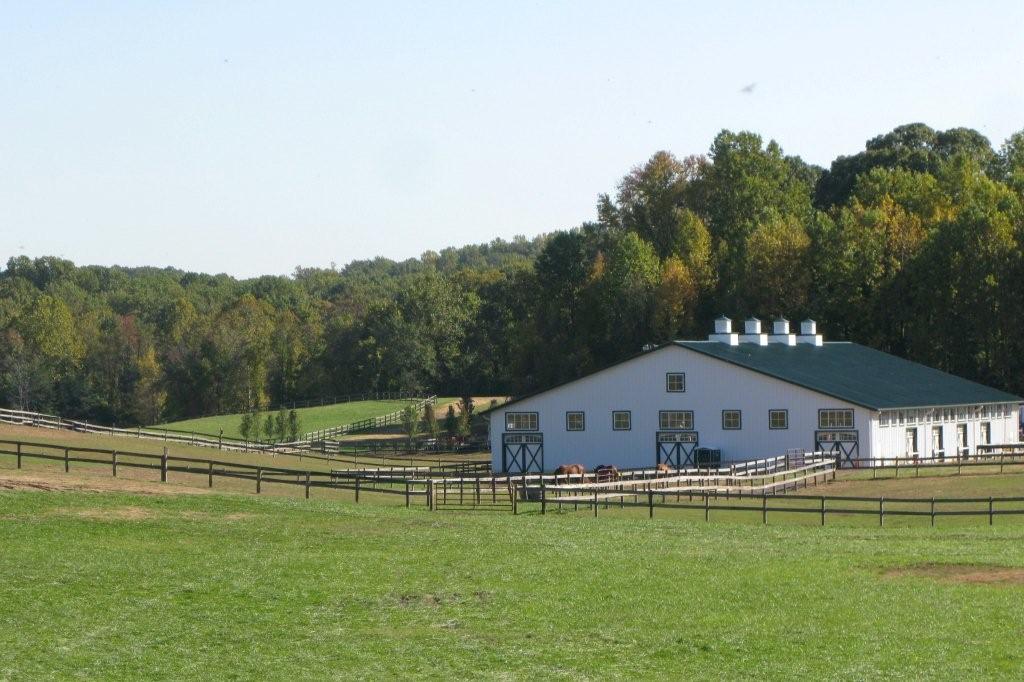
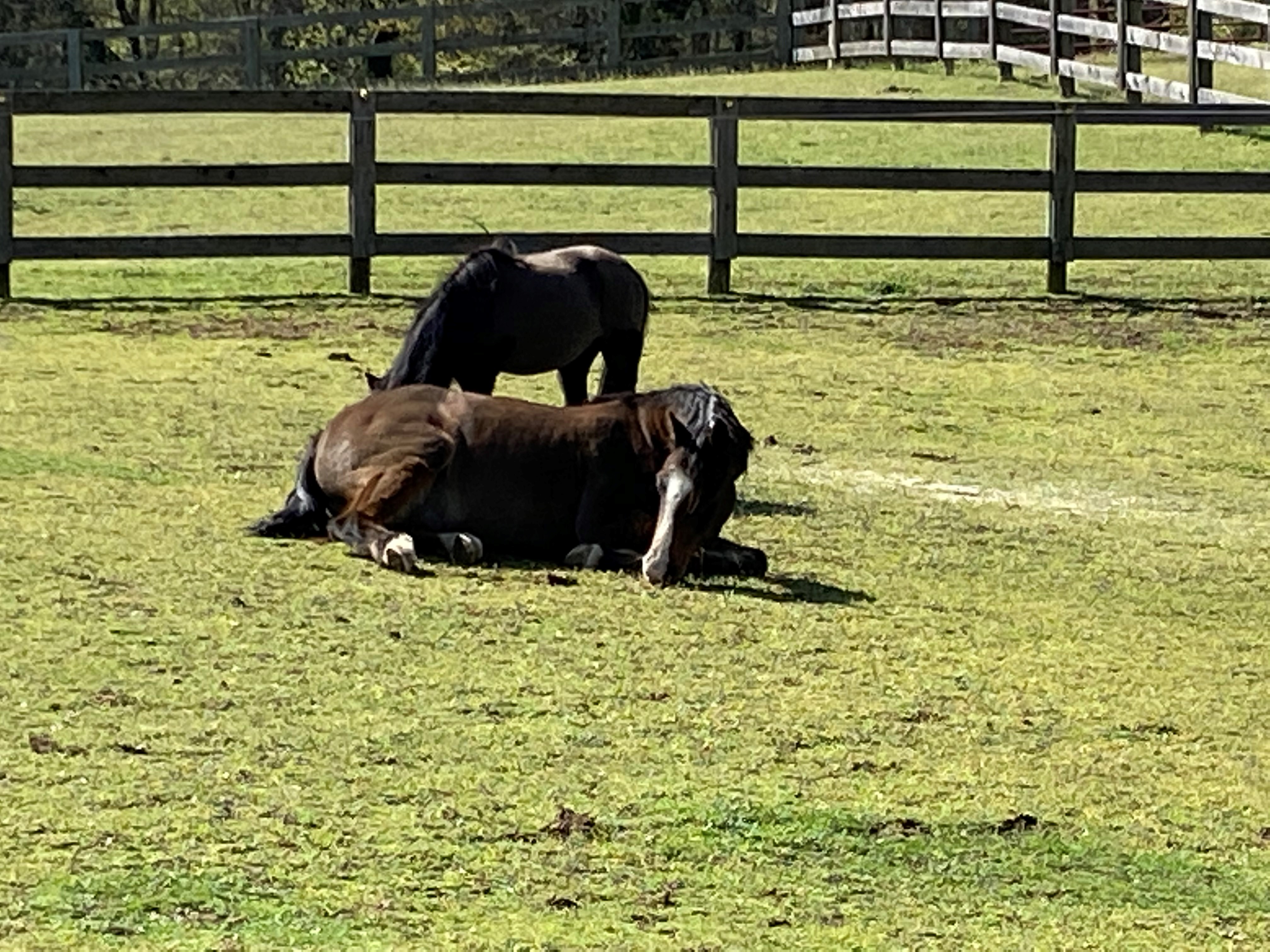
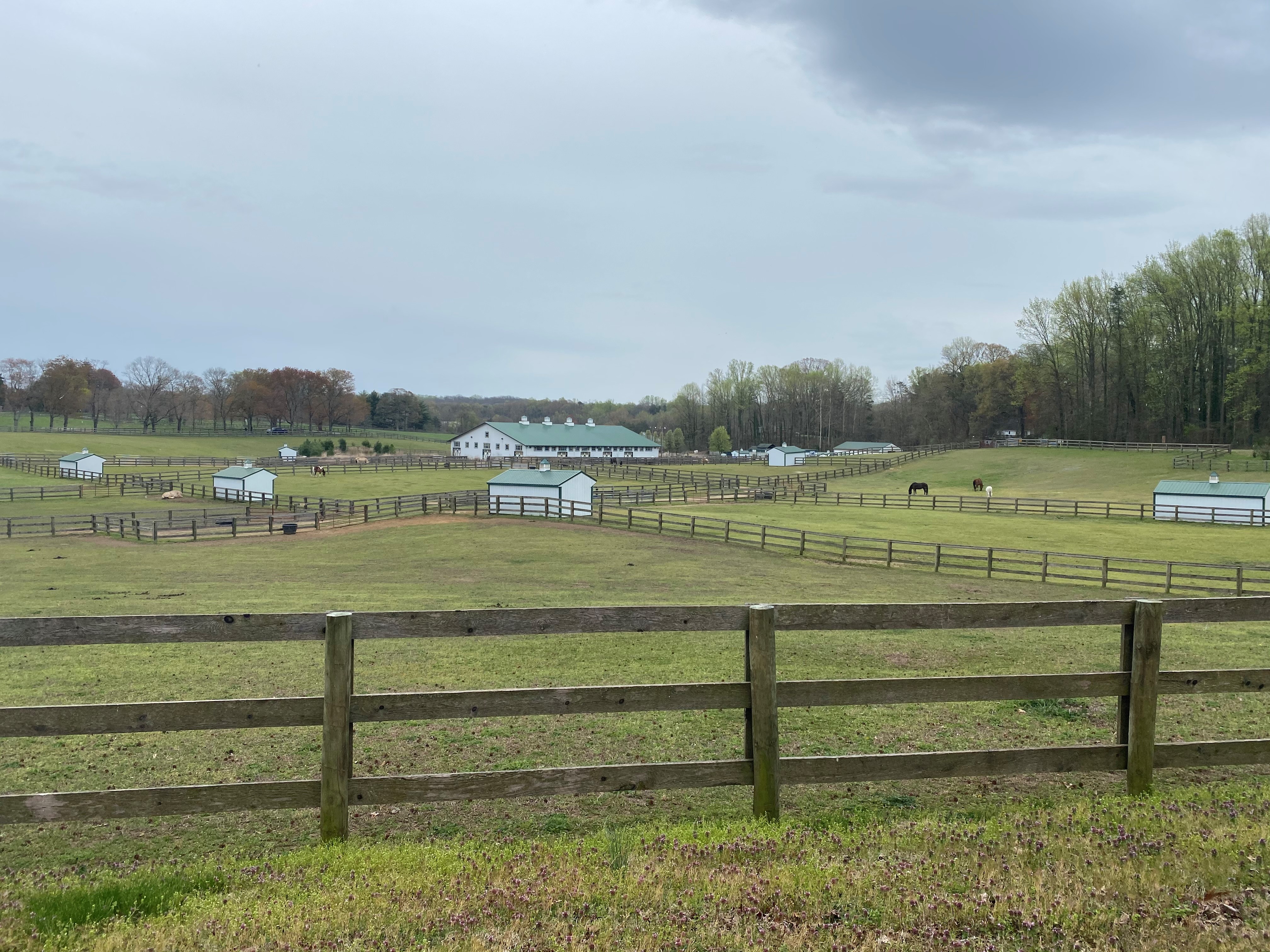
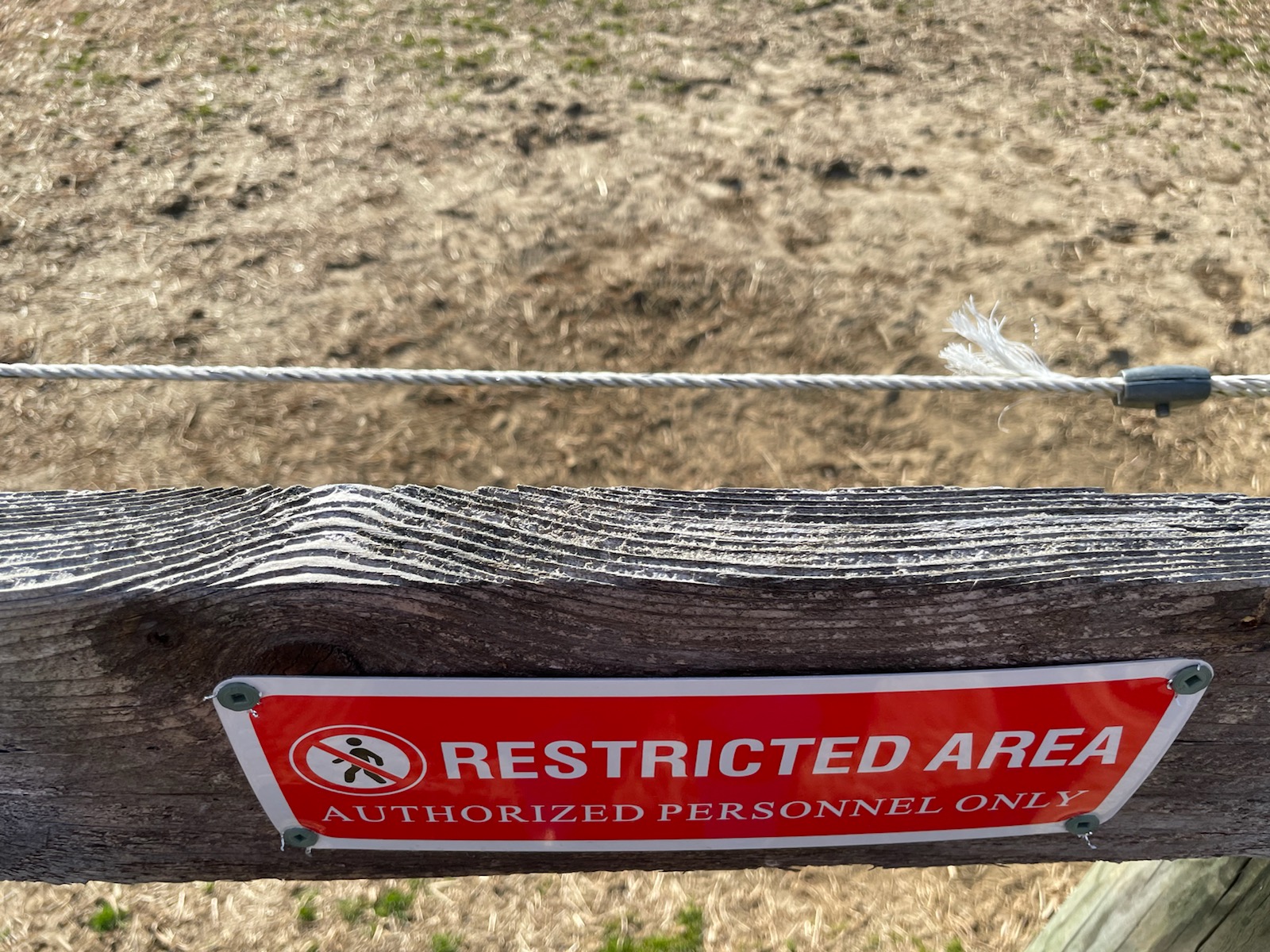
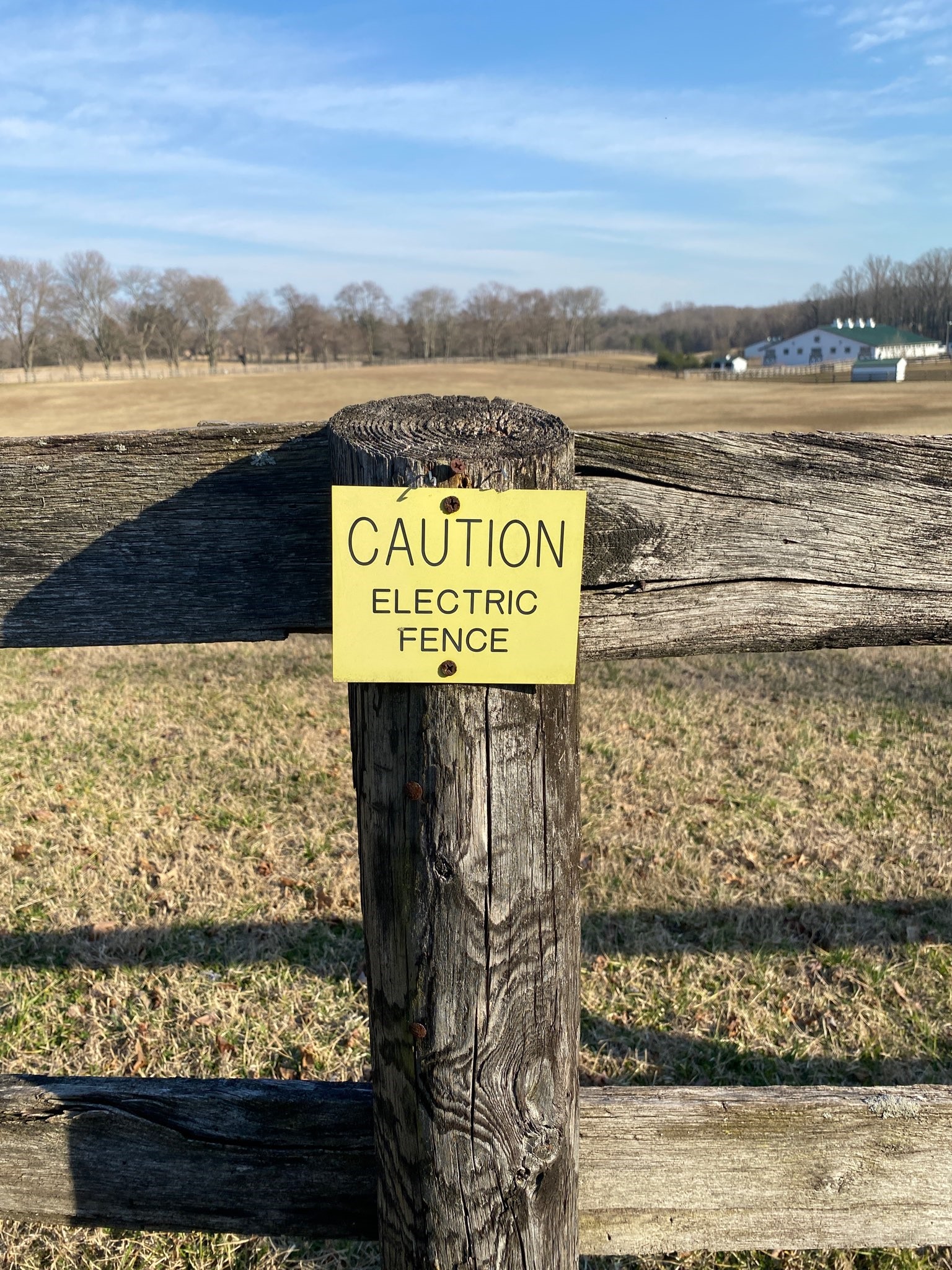
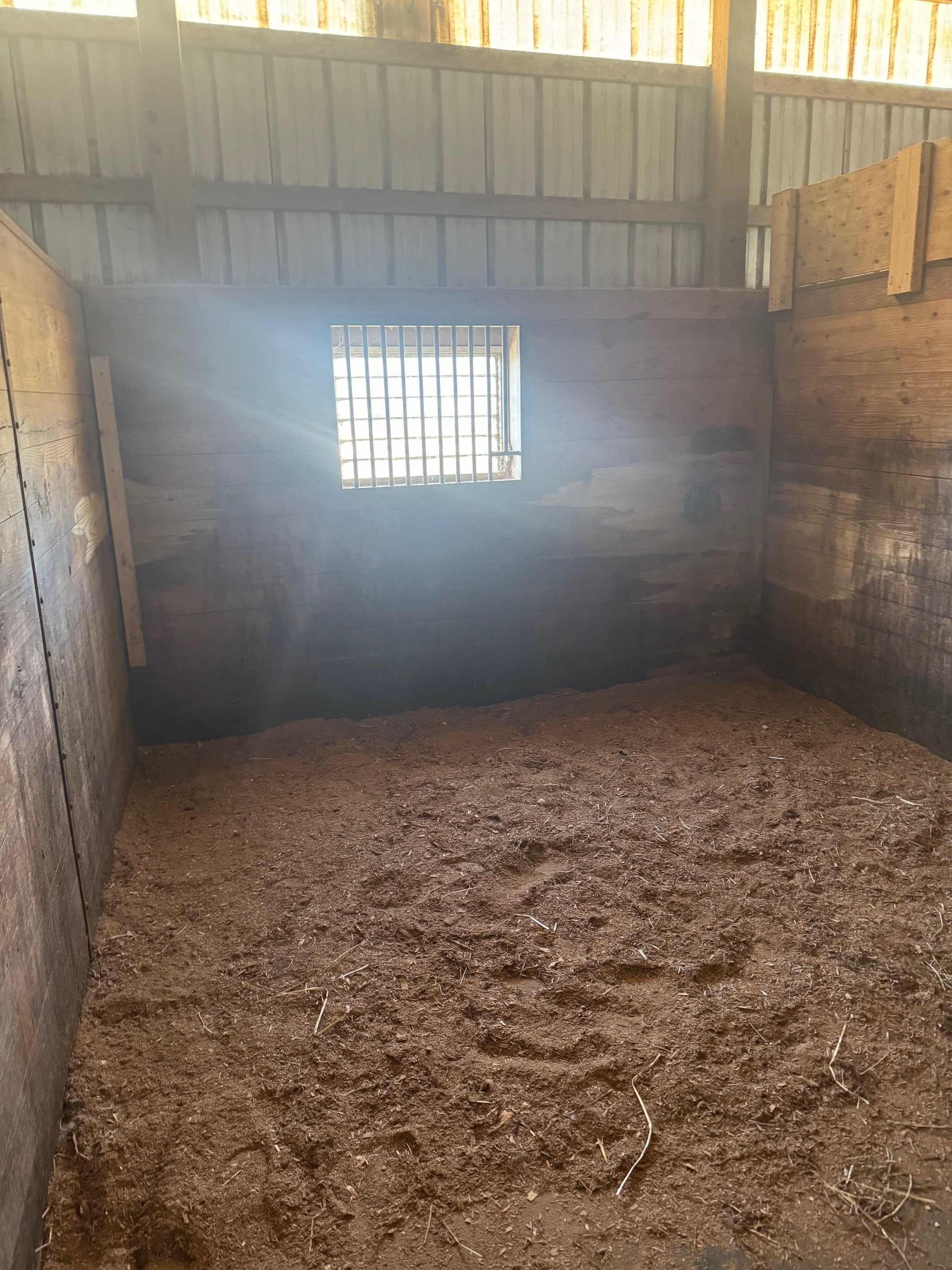
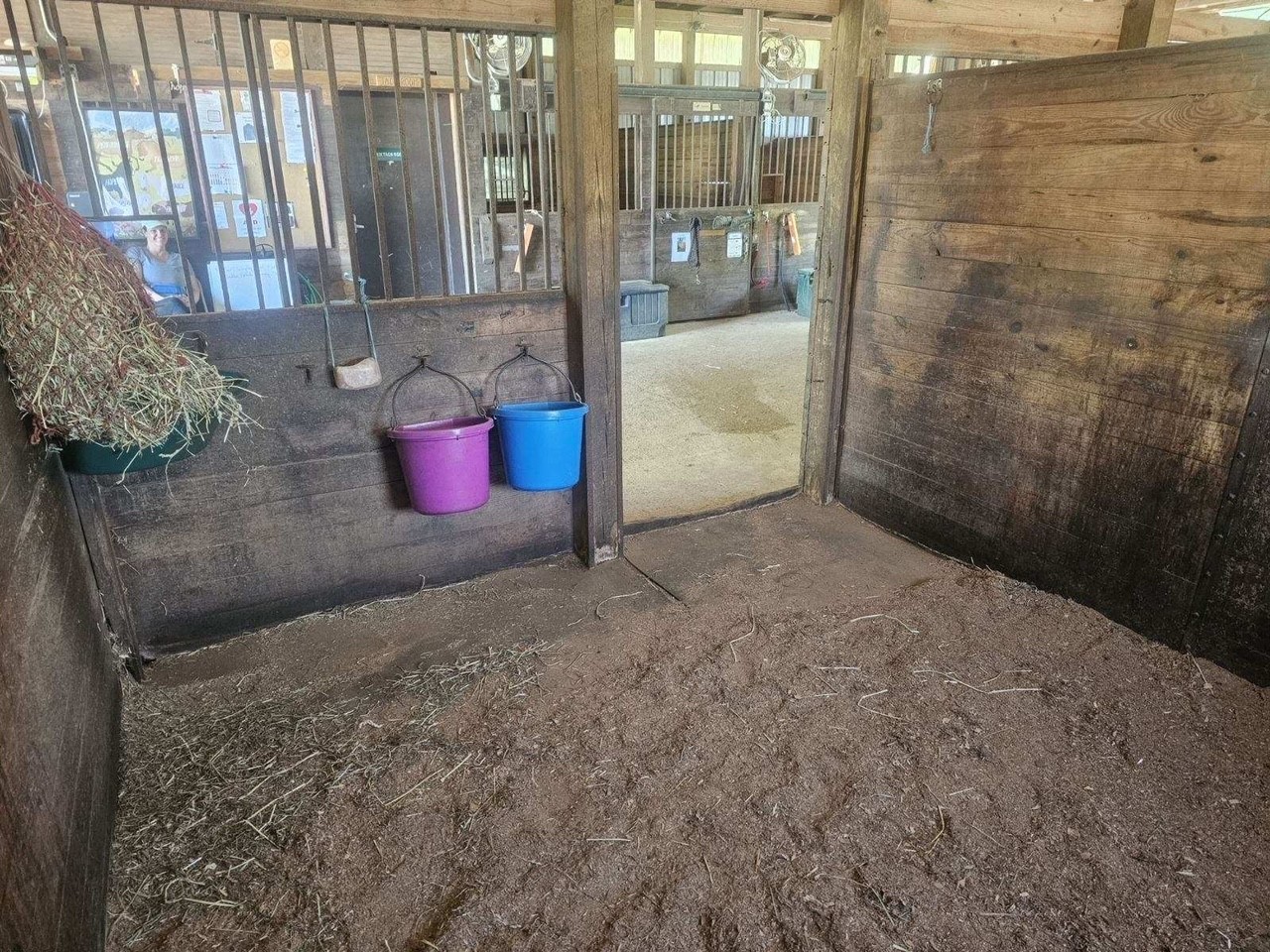
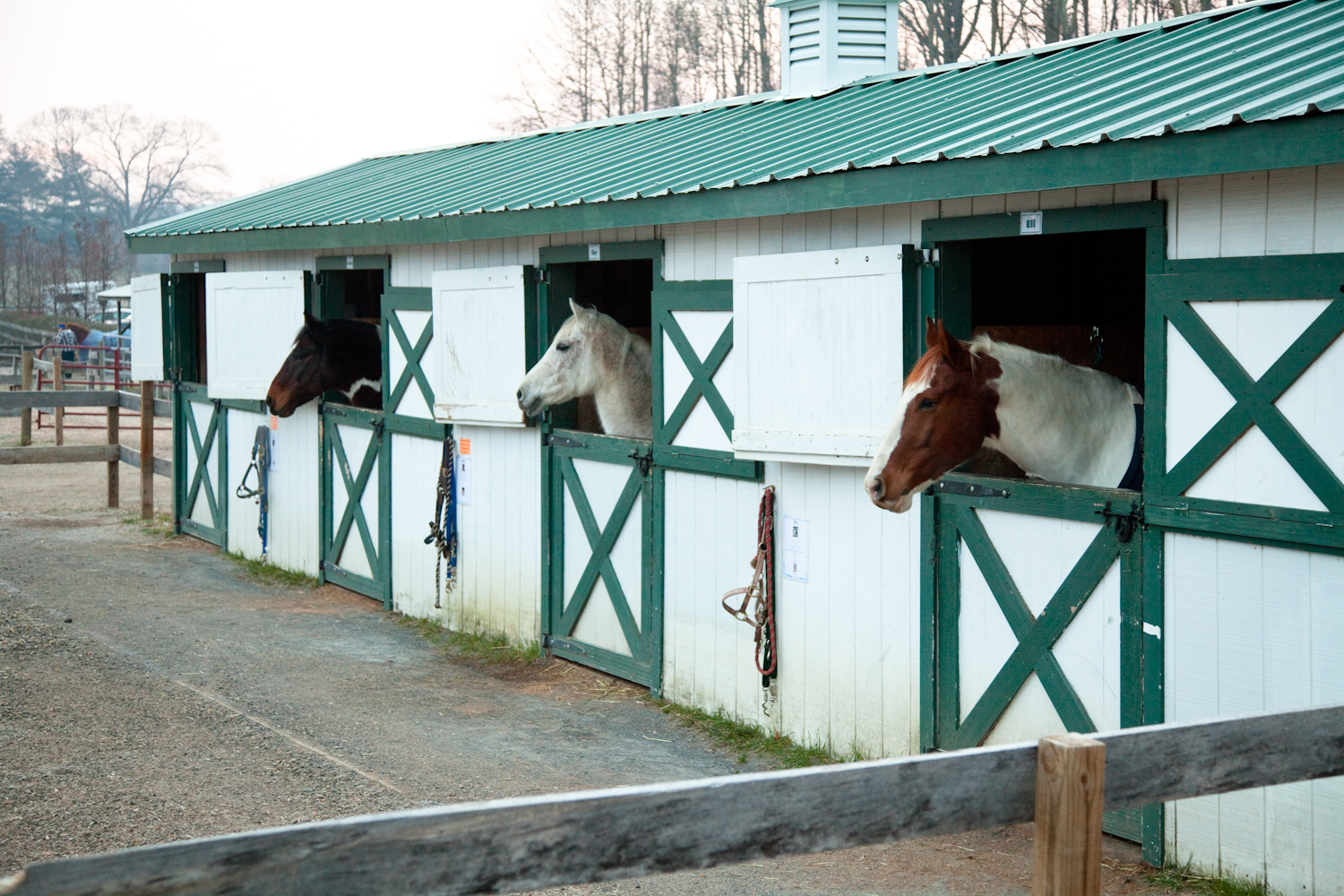
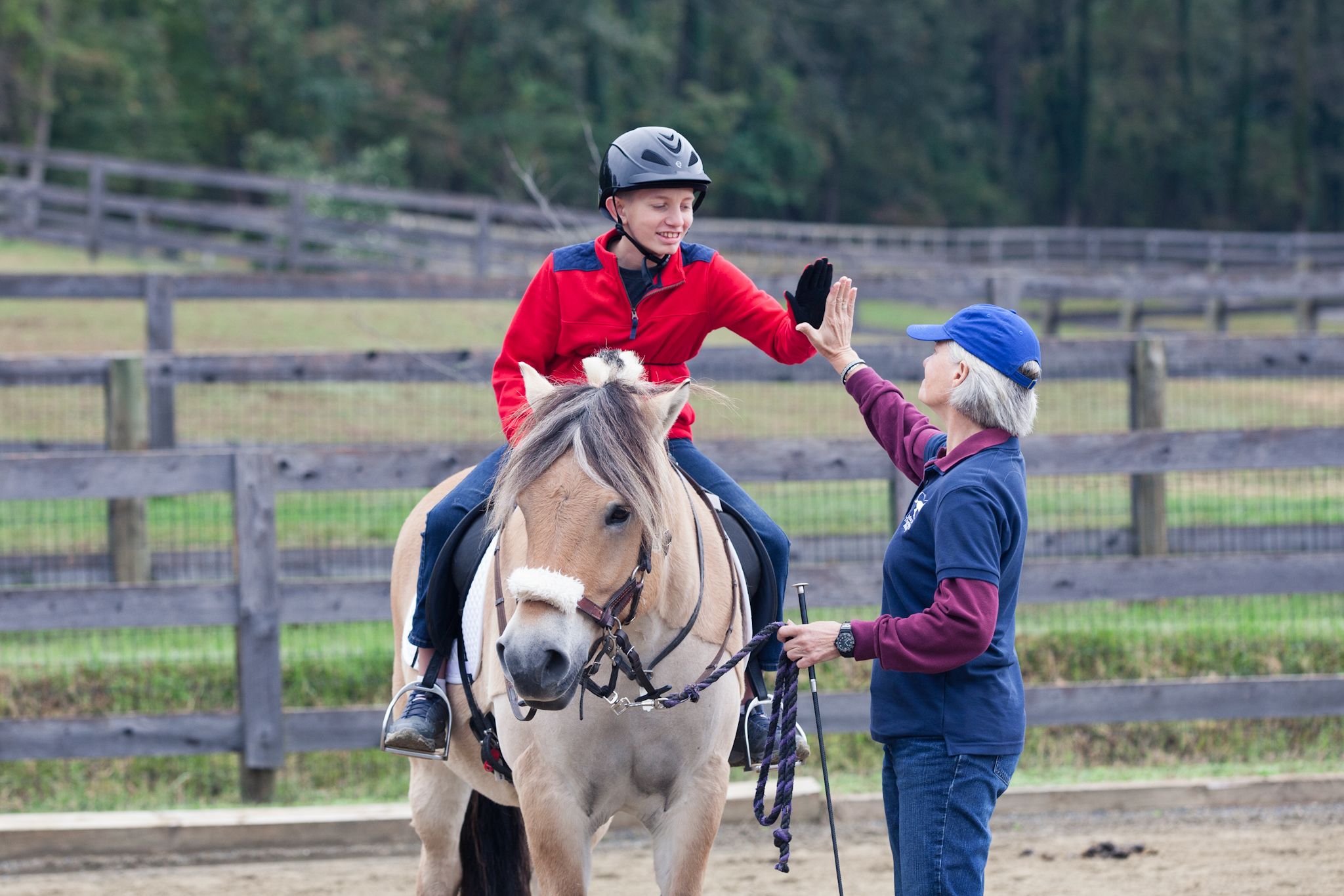
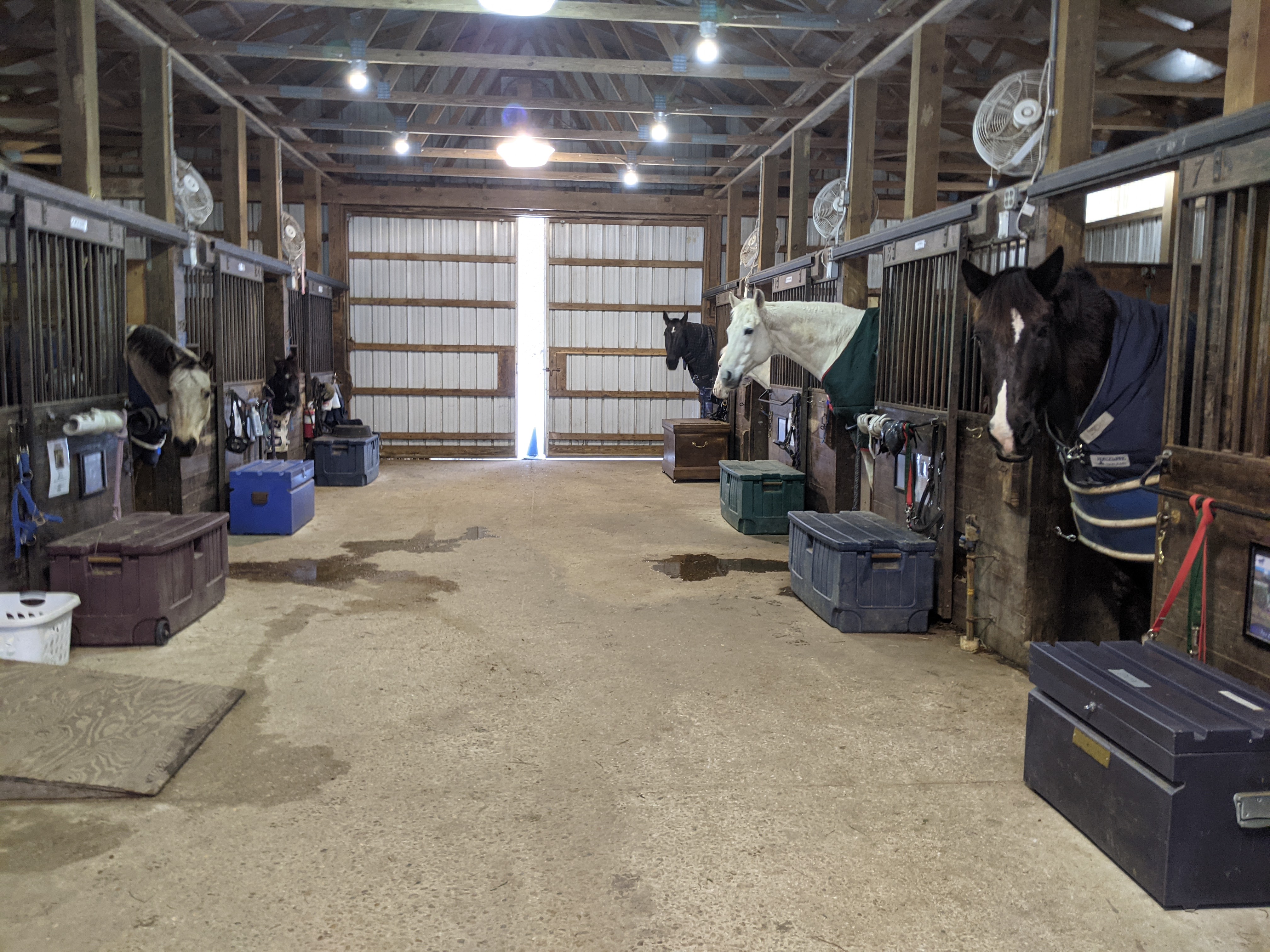
Are the organization's rules, restrictions and warnings (signage) conspicuously posted in easily accessible locations? Yes
Are the organization's emergency contacts, including veterinarian contact information, conspicuously posted in easily accessible locations? Yes
Are human and equine first aid kits easily accessible? Yes
Regarding all shelters where horses are housed including run-in sheds:
Do horses have assigned stalls in the barn/structure(s) or exclusively assigned shelter locations where they are separated from other horses with a barrier? Yes
How many hours per day, on average, are horses stalled or restricted to these sheltered exclusive shelter locations? 0-3;
How often are the stalls/shelters cleaned, i.e., kept in good repair and free of standing water, accumulated waste, sharp objects and debris? 6-7 Days a Week
Do all stalls/shelters allow horses to lie down, stand up and turn around and provide protection from inclement weather (wind, sleet, rain, snow and extreme temperatures)? Yes
Are stalls/shelters kept in good repair, with adequate ceiling height, and free of standing water, accumulated waste, sharp objects and debris? Yes
Are floors constructed and maintained for both good drainage and traction? Yes
Is there a ventilation and circulation system in place to allow free flow of air to control temperature, and humidity, and to prevent air stagnation? Yes
Is wiring inaccessible to horses and maintained for safety in all areas of facility? Yes
Are fire prevention/protection measures (fire alarms, extinguishers and sprinkler systems) maintained and in good working order? Yes
Is there adequate lighting to ensure safety in all areas of facility? Yes
How many hours per day, on average, are horses turned out:
Equines are out 16+ hours per day
Equines are out 24/7 except they are brought in if there is inclement weather
Equines are out 24/7 except when they are being trained
Equines are out 24/7 except when they are used for the conduct of the organization's programs
The following describes the pastures at this facility:
This facility has a written plan in place for pasture management, which includes guidelines for seeding, fertilizing, irrigation, mowing, dragging, harrowing, manure removal, removal of debris, the control of poisonous plants, and a schedule for cleaning
A dedicated staff person(s) is responsible for pasture management
All pastures are fenced to prevent escape or injury
Electric fencing is used; electric wires or tape fence are visibly marked
Fencing checks, such as broken or missing planks, loose fence posts, exposed or loose nails, detached wires, etc., are done regularly
Pastures are rotated
Pastures have natural protection for equines (i.e., trees)
Pastures have man-made protection for equines (i.e., shelters)
This facility does not have pastures where equines can graze on pasture grass
Barbed wire is used for fencing
The following describes the turnout areas other than pastures at this facility:
This facility has a written plan in place for the maintenance of turnout areas, which includes a schedule for cleaning, manure removal, and dragging
A dedicated staff person(s) is responsible for the maintenance of turnout areas
All turnout areas are fenced to prevent escape or injury
Electric fencing is used; electric wires or tape fence are visibly marked
Turnout areas have man-made protection for equines (i.e., shelters)
Fencing checks, such as broken or missing planks, loose fence posts, exposed or loose nails, detached wires, etc., are done regularly
This facility does not have turnout areas
Barbed wire is used for fencing
The following policies and procedures are in place at the facility to restrict public access and to keep horses safe:
There is a practice in place to monitor equines overnight
By Appointment Only signs are posted.
No Trespassing signs are posted
Hold Harmless signs are posted
Authorized Personnel Only signs are posted
Entrance gates are locked at night
Visitors are only permitted at specific times
Visitors are only permitted in specific areas
The property is fitted with motion lights
The property is fitted with a security system that is monitored internally by staff (or the property owner)
The perimeter of the property is fully fenced
The property owner, staff member or caretaker lives on the premises and ensures that public access is restricted and is responsible for the security of the facility and equines
A security guard is present at night
The property is fitted with a security system monitored by police or a professional service
Equine Care/Emergency Preparedness: Maryland Therapeutic Riding, Inc. (*Main) 2026 and 2025 This section is required.
Horse Health Care/Barn Management Records: What system is used to collect and store health/horse care records?
Our organization utilizes a software application to maintain records
The following items are consistent with our feed management plan and practices:
Equines are provided with individualized feeding plans, including supplements, according to the equine's age, breed/type, condition, size, work level and any health issues, consisting of nutritious food provided in sufficient quantity and access to adequate natural forage, or be fed daily, or as recommended by the organization's veterinarian
Feed plans are determined in consultation with a veterinarian
Supplement plans are determined in consultation with a veterinarian
Equines are fed grain in individual stalls
Staff and/or volunteers are trained in proper feed measurements and protocols and observed periodically to ensure they are feeding correctly
The feed chart is centrally located and updated as needed
The area(s) where hay, feed, grain, and supplements are stored are kept clean, free of debris and chemicals, and protected from weather and other animals in rodent-proof and mold-proof containers and grain bins
Feed, supplements and hay types are clearly labeled
Water sources, i.e., buckets, troughs, automatic waterers, etc. are kept clean, free of contaminants, debris and chemicals, protected from weather and other animals, and be positioned or affixed to minimize spillage.
Medications are kept in a secure area
Equines are fed grain in groups
Is clean, potable water available at all times for all equines? Yes
Hoof Care: How often is hoof care provided for each equine? Every 4-8 weeks and when an issue arises
Dental Care: How often is dental care provided for each equine? Annually and when an issue arises
Horse checks: How often are equines visually and physically checked by personnel at the facility? Every day or 6 days a week
Our organization has the following parasite and fly/insect control protocols in place, including remedies used to control flies and insects:
Our organization follows the parasite control guidelines of our veterinarian, including fecal testing and de-worming
Fly/Insect Control Remedies:
Fly parasites
Feed Through Products
Fly Traps and Tapes
Fly Spray Repellent
Fly Masks
Fly Sheets
Fans
The following represent the biosecurity practices in place at facility:
Our organization follows the biosecurity guidelines of our veterinarian
Sick, affected and/or quarantined equines do not have contact with other equines or other animals
The organization has a written biosecurity plan
Staff are trained in best practices related to biosecurity
Volunteers are trained in best practices related to biosecurity
A specific individual is trained and assigned to care for sick, affected and/or quarantined equines
Restricted access signs are posted at primary points of access to sick, affected and/or quarantined equines
Hand sanitizers are available at all primary points of access to sick, affected and/or quarantined equines
Footbaths are available at all primary points of access to sick, affected and/or quarantined equines
Manure and bedding from sick, affected and/or quarantined equines is removed from the facility - not put in open air piles, and not spread on pastures
Quarantine areas, such as stalls, aisle ways, paddocks, and common areas, are cleaned (and needed, disinfected) after conclusion of the quarantine.
Trailers/vans used by sick, affected and/or quarantined equines are cleaned and disinfected after each use and cleaning takes place away from where equines are sheltered
Equipment used by sick, affected and/or quarantined equines is not shared
Equipment used by sick, affected and/or quarantined equines is cleaned of organic debris and disinfected after each use
Latex gloves, or equivalent gloves, are worn when working with sick, affected and/or quarantined equines
Sick, affected and/or quarantined equines are cared for last if the caretaker must also care for healthy equines
Equines are not quarantined on arrival.
Additional information on biosecurity:
I have updated our profile to reflect current biosecurity practices at MTR which includes written guidelines as well as trainings for both staff and volunteers. Written guidelines have been emailed to Equus.
The following represent the manure removal practices in place at facility:
Manure is stored in dumpster(s)
Manure is hauled, sold or given away
Our organization adheres to the manure management guidelines set by the state, local authorities, and/or our organization's veterinarian
Manure is piled in an area where equines are not located
Manure piles are covered
Manure piles are composted or spread on pastures
The following steps are taken to help staff and volunteers readily identify each horse on the property:
Equines are assigned the same exclusive stall/shelter location each day
Name plates are located on the stall/shelter location
Photos are located on the stall/shelter location
Equines wear halters with nametags
A notebook or binder with photos and information on each equine is easily accessible
A map/diagram is posted showing the location of each equine with equine names and photos
Equine photos and profiles are available on the website
Staff and volunteers are provided with an information packet with equine profiles, including photos and detailed descriptions
Staff/volunteers are provided training on conformation, markings, colors, and breeds
Team leaders work with new staff/volunteers until they are able to identify the equines
Our organization has the following policies and procedures in place pertaining to tack, apparel and equipment:
All equines have specifically assigned apparel, equipment and tack (saddles/bridles if ridden) that is not shared
Blankets, sheets and turn out apparel are fitted and utilized for each equine appropriate to the equine's needs and the weather conditions
Blankets, sheets and turn out apparel are cleaned regularly as needed
Riding Tack is always cleaned after each use
Riding Tack is inspected for overall working condition before each use by trained personnel
Riding Tack is assessed for fit before each use by trained personnel
Riding Tack is assessed for fit by trained personnel when an equine's body condition changes
Riding Tack is assessed for fit by trained personnel when an equine's disposition changes
This facility enlists the services of a professional saddle fitter at least once a year
Assigned riding tack is clearly labeled
Riding Tack is stored in a climate-controlled location
Helmets are replaced after a fall
Helmets are replaced at least every five years.
Saddles are shared
Saddle pads are shared
Bridles are shared
Bits are shared
Blankets are shared
Sheets are shared
Turnout apparel is shared
Halters are shared
Riding Tack is always cleaned at least weekly
Riding Tack is cleaned only when needed
Helmets are shared
Helmets are cleaned/disinfected after each use
No equines are ridden; saddles, bridles, etc. not applicable.
Emergency Preparedness: Maryland Therapeutic Riding, Inc.: *Main This section is required.
The following plans, policies, and procedures are in place at the facility to handle emergencies and address weather related issues, fire safety procedures, and/or any additional hazardous scenarios the facility could potentially experience:
Emergency procedures are posted prominently
The facility owns or has access to a generator
The facility maintains at least two weeks of hay, feed, shavings and medications
The facility collects and maintains medical information from staff, volunteers, and clients
The facility maintains appropriate liability and/or workers' compensation insurance
The organization has a written emergency preparedness/safety plan (EPP)
Local fire department and/or the state's emergency planning department procedures
Medical emergencies for clients, staff, and volunteers
Medical emergencies for equines
Evacuation plans
Power outages
Fire
Natural Disasters - thunderstorm, hurricanes, earthquakes, tornados, etc
Terrorist attacks
Protocols to notify emergency personnel
Building/facility exit plans
The facility follows the specific procedures to help PREVENT emergency situations:
Smoking is strictly prohibited
NO SMOKING signs are posted prominently
Hay is stored away from permanent or temporary structures where equines are stalled
Permanent or temporary structures where equines are stalled are kept free of dust, cobwebs, trash, cleaning rags, and other flammable items
Aisles and doorways are kept clear
Heaters with automatic shutoff settings are used
How often are the following checked or performed?
Fire Extinguishers are checked: Semi-annually
Smoke detectors are checked: Quarterly
Fence lines are checked: Daily
Turnout Areas are checked: Daily
Sprinkler systems are checked: Not at all/NA
Fire drills are conducted: Semi-annually
Review of safety protocols with staff are conducted: Quarterly
Review of safety protocols with volunteers are conducted: Quarterly
The Emergency Preparedness Plan is reviewed and updated: Annually
Equine Transportation: 7= Onsite: 2 (1 + 1) + Offsite: 5
2-horse van/trailer with truck:
1 Owned onsite 1 Access onsite but not owned 1 Access offsite;
3-horse van/trailer with truck:
1 Access offsite;
4-horse van/trailer with truck:
1 Access offsite;
6-horse van/trailer with truck:
1 Access offsite;
8-horse van/trailer with truck:
1 Access offsite;
© Copyright 2018 EQUUS Foundation 672 5.00